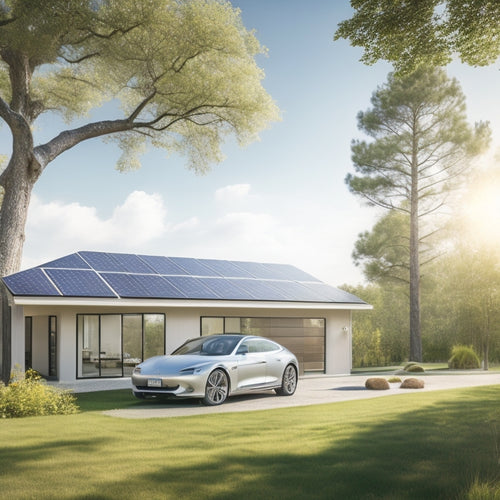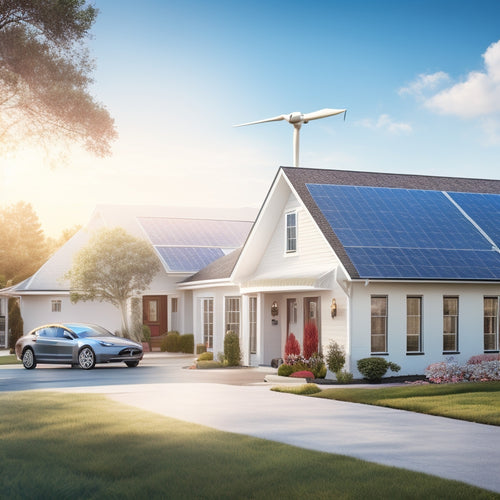
Best Solar Panel Systems for Residential Use
Share
When choosing the best solar panel system for your residential use, you'll want to take into account top-rated brands like SunPower, Panasonic, and Trina Solar, which offer high-efficiency technologies like PERC, HJT, and IBC cells. You'll also need to decide on the type of solar panel system, such as monocrystalline, polycrystalline, or thin film, and assess your energy efficiency and performance needs. Additionally, factors like system cost, installation, and energy storage options will impact your decision. With so many considerations, it's crucial to weigh your options carefully - and there's more to investigate to find the perfect system to suit your needs.
Key Takeaways
- Top-rated solar panel brands like SunPower and Panasonic offer high-efficiency technologies like PERC and HJT cells for optimal energy output.
- Monocrystalline panels provide high efficiency, while polycrystalline and thin-film options offer lower costs and flexibility.
- System cost breakdown includes solar panels, inverters, mounting hardware, and equipment, with installation labor costs ranging from $0.50 to $1.50 per watt.
- Energy efficiency and performance are crucial, with solar efficiency ratings exceeding 20% and inverter efficiency impacting overall system performance.
- Warranty and customer support are essential, with a minimum 25-year warranty coverage on panels and inverters, and quality customer support indicated by online reviews and feedback.
Top Rated Solar Panel Brands
As you begin exploring the world of solar energy, one crucial aspect to reflect on is the brand of solar panels you'll be investing in. The solar panel brand you choose can greatly impact the performance, durability, and overall value of your solar panel system.
When it comes to top-rated solar panel brands, you'll want to take into account those that prioritize innovation and state-of-the-art technology.
Look for brands that have made considerable contributions to solar panel innovations, such as bifacial panels, half-cut cells, and advanced busbar designs. These advancements can increase energy output, reduce energy losses, and enhance the overall efficiency of your solar panel system.
Top solar technologies like PERC, HJT, and IBC cells are also crucial features to look for in a reputable brand. Brands like SunPower, Panasonic, and Trina Solar are known for their high-efficiency panels and commitment to research and development.
System Cost and Installation
You're likely wondering how much a solar panel system will cost you, and what makes up that cost.
The system price breakdown typically includes the cost of the solar panels themselves, inverters, mounting hardware, and other equipment.
You'll also need to factor in installation labor costs, which can vary depending on the complexity of the installation and the installer's rates.
System Price Breakdown
Typically, homeowners evaluating solar panel systems want to know the total cost of the system, including installation.
When examining system price breakdowns, you'll want to take into account the following components:
-
System hardware costs: This includes the solar panels, inverters, mounting hardware, and other equipment necessary for the system to function.
-
System design and engineering costs: This covers the cost of custom designing a system that meets your energy needs and complies with local building codes.
-
Permitting and inspection costs: You'll need to factor in the cost of obtaining necessary permits and passing inspections to verify your system is installed correctly.
-
System financing options: You may be eligible for financing options, such as loans or power purchase agreements, to help offset the upfront cost of the system.
-
Tax incentives: Don't forget to factor in the tax incentives you may be eligible for, such as the federal solar investment tax credit (ITC), which can greatly reduce the overall cost of the system.
Installation Labor Costs
Your solar panel system's installation labor costs play a significant role in the overall system cost and installation process. These costs vary depending on the installation methods used, the complexity of the installation, and the location of your residence.
On average, installation labor costs range from $0.50 to $1.50 per watt, which translates to around $2,500 to $7,500 for a typical 5-kilowatt residential solar panel system.
To get an accurate estimate, you'll need to consult with a solar panel installation company. They'll assess your roof's size, shape, and condition, as well as any potential obstacles, such as skylights or vents.
They'll also consider the type of solar panels and equipment you've chosen, as well as the installation's intricacy. Based on this assessment, they'll provide you with labor estimates, which will be added to the system's total cost.
Be sure to ask about any additional costs, such as permits, inspections, and connection fees, to get a thorough understanding of your system's installation costs.
Energy Efficiency and Performance
When it comes to going green, a solar panel system's energy efficiency and performance are crucial factors to contemplate. You want to verify that your investment generates the maximum amount of clean energy possible.
Solar efficiency, measured by the percentage of sunlight converted into electricity, is a critical performance metric.
- Look for systems with high solar efficiency ratings, typically above 20%.
- Be aware of temperature coefficients, which impact performance in hot climates.
- Check the maximum power output (watts) and voltage tolerance.
- Consider the inverter efficiency, as it affects the system's overall performance.
- Review the manufacturer's performance warranty, typically 25 years or more.
Types of Solar Panel Systems
Now that you've evaluated the energy efficiency and performance of solar panel systems, it's time to investigate the various types available. You'll find that each type has its unique characteristics, advantages, and disadvantages.
Here is a summary of some popular types of solar panel systems:
| Type | Description |
|---|---|
| Monocrystalline Panels | High-efficiency, single-crystal silicon cells with high solar panel efficiency (15-20%) |
| Polycrystalline Panels | Lower-cost, multi-crystal silicon cells with moderate solar panel efficiency (12-15%) |
| Thin Film Technology | Low-cost, flexible panels with lower solar panel efficiency (7-14%) |
| Bifacial Modules | Double-sided panels that capture energy from both sides, increasing overall energy output |
In addition to these, you may also come across integrated solar roofs, portable solar kits, and building-integrated photovoltaics (BIPV). Each type has its application, and understanding their differences will help you choose the best solar panel system for your residential needs.
Residential Solar Panel Benefits
As you consider investing in a solar panel system for your home, it's essential to understand the numerous benefits that come with it.
By installing a solar panel system, you can:
-
Reduce your environmental impact by utilizing clean, renewable energy from the sun, decreasing your reliance on fossil fuels and lowering your carbon footprint.
-
Enjoy long term savings on your electricity bills, as solar energy is free and abundant, markedly reducing your energy costs.
-
Increase your property value, as solar panel systems are a desirable feature for homebuyers, leading to higher selling prices and improved marketability.
-
Benefit from low maintenance costs, as solar panels have no moving parts and are designed to last for decades with minimal upkeep.
-
Take advantage of government incentives and tax credits, which can help offset the initial cost of installation and make solar energy more accessible to homeowners.
Factors to Consider When Buying
Selecting the right solar panel system for your home requires careful evaluation of several key factors. You'll want to assess solar panel efficiency, ensuring you get the most energy output from your system.
Installation timelines are also vital, as you'll need to plan around the installation process and potential disruptions to your daily routine.
Financing options, including government incentives and rebates, can greatly influence the upfront cost of your system. Don't forget to take into account the environmental impact of your solar panels, including their recyclability and carbon footprint.
Local regulations and permits may also affect your installation, so be sure to research these thoroughly.
Additionally, think about system maintenance and aesthetic considerations, such as the appearance of the panels on your roof.
Grid connectivity is also important, as it allows you to sell excess energy back to the grid and offset your energy costs.
Finally, reflect on future scalability, ensuring your system can be easily expanded or upgraded as your energy needs change.
Inverters and Charge Controllers
How efficiently can your solar panel system convert DC power into usable AC energy? This depends on the quality and type of inverter installed.
Inverters are essential components that convert DC power from solar panels into AC power for your home. There are three main inverter types: string inverters, microinverters, and power optimizers. String inverters are the most common, but microinverters offer more flexibility and monitoring capabilities. Power optimizers provide module-level monitoring and optimization.
When selecting an inverter, consider the following factors:
- Maximum power point tracking (MPPT) efficiency
- Compatibility with your solar panel system
- Monitoring and tracking capabilities
- Warranty and durability
- Compliance with local electrical codes and standards
Charge controllers, on the other hand, regulate the flow of energy from your solar panels to your battery bank.
Key charge controller features include:
- Maximum power point tracking (MPPT)
- Overcharge protection
- Low voltage disconnect
- Temperature compensation
- Monitoring and tracking capabilities
Battery Storage and Backup
You'll need to evaluate energy storage options to guarantee a steady supply of power when the sun isn't shining.
Backup power systems can provide peace of mind during grid outages, and off-grid capabilities allow for true energy independence.
Energy Storage Options
Energy storage options are an essential component of any solar panel system, as they allow you to store excess energy generated during the day for use during the night or on cloudy days. This excess energy can be stored in batteries, which can be charged and discharged as needed.
When selecting an energy storage option, you'll want to reflect on the following factors:
-
Battery Technologies: Advances in battery technologies have made energy storage more efficient and cost-effective. Look for systems that employ lithium-ion or lead-acid batteries for peak performance.
-
Solar Integration: Confirm your energy storage system is designed to seamlessly integrate with your solar panel system, allowing for efficient energy harvesting and storage.
-
Depth of Discharge: Reflect on the depth of discharge (DOD) of your battery, which affects its lifespan and overall performance.
-
Round-Trip Efficiency: Assess the round-trip efficiency of your energy storage system, which measures the amount of energy available for use after storage and retrieval.
-
Scalability: Choose an energy storage system that can be scaled up or down to meet your changing energy needs.
Backup Power Systems
Three key benefits come with incorporating a backup power system into your solar panel setup: reduced reliance on the grid, protection from power outages, and minimized downtime. This means you'll have a steady flow of electricity even when the grid goes down, ensuring your home remains powered and comfortable.
With a backup power system, you can enjoy solar resilience, knowing that your energy needs are met even in the face of grid instability.
A backup power system typically consists of a battery storage system, an inverter/charger, and a monitoring platform. The battery storage system stores excess energy generated by your solar panels during the day, which can then be used to power your home during the night or during a power outage.
The inverter/charger converts the DC power from your solar panels and battery storage system to AC power, making it usable in your home. The monitoring platform provides real-time observations into your energy production, storage, and consumption, allowing you to optimize your energy usage.
Off-Grid Capabilities
With a backup power system in place, you can take your solar panel setup to the next level by exploring off-grid capabilities. This means you can live off the grid, relying solely on your solar panel system for power.
By incorporating battery storage and backup into your system, you'll have energy independence and can reduce your environmental impact.
Some benefits of off-grid capabilities include:
-
Rural electrification: Bring power to remote areas where traditional grid connections are unavailable
-
Emergency preparedness: Have a reliable source of power during outages or natural disasters
-
Sustainable lifestyle: Live off the grid while still enjoying modern comforts
-
Power autonomy: Generate and store your own power, reducing reliance on the grid
-
Energy resilience: With a backup system, you'll have a safety net in case of power outages or equipment failure
Warranty and Customer Support
When investing in a solar panel system, you expect it to last for decades, and a thorough warranty and reliable customer support are essential to ensuring that your system continues to perform efficiently throughout its lifespan.
A detailed warranty coverage provides you with peace of mind, knowing that you're protected against defects, malfunctions, and performance issues. Look for manufacturers that offer a minimum of 25-year warranty coverage on their solar panels and inverters.
You should also consider the quality of customer support provided by the manufacturer. Check online reviews and customer feedback to gauge the responsiveness and helpfulness of their support team.
A reputable manufacturer should offer multiple channels of support, including phone, email, and online chat. They should also have a detailed resource library, including tutorials, FAQs, and troubleshooting guides.
With a reliable warranty and excellent customer support, you can rest assured that your solar panel system will continue to generate clean energy for years to come.
Best System for Your Budget
Your budget plays a significant role in determining the best solar panel system for your needs. You need to evaluate the upfront cost, financing options, and long-term savings to make an informed decision.
Budget planning is essential to guarantee you get the most out of your investment.
When evaluating solar panel systems, think about the following factors to fit your budget:
-
System size: A smaller system may be more affordable, but it may not meet your energy needs.
-
Panel quality: High-efficiency panels may be more expensive, but they can provide more power per hour of sunlight.
-
Inverter type: String inverters are generally cheaper than microinverters, but may not be as efficient.
-
Installation company: Research and compare prices from different installers to find the best deal.
-
Financing options: Look into local and national incentives, such as tax credits and rebates, to reduce the upfront cost.
Frequently Asked Questions
Can I Install Solar Panels on a Metal Roof?
You can install solar panels on a metal roof, leveraging its advantages like durability and water-tightness. However, you'll need to contemplate installation specifics, such as securing panels with clamps or adhesive, and ensuring a watertight seal around mounts.
Do Solar Panels Work During a Power Outage?
During a power outage, you won't have power from your solar panels unless you have a backup power system, as solar panels can't provide electricity when the grid is down, reducing solar panel efficiency.
Are Solar Panels Resistant to Hail Damage?
Can you imagine a hailstorm pelting your roof, wondering if your solar panels will hold up? Fortunately, you'll find that most solar panels are designed to withstand hail impact, boasting impressive solar durability with some even certified to resist hail up to 1 inch in diameter.
Can I Add Solar Panels to an Existing System?
You can expand your existing solar setup by adding new panels, but verify solar panel compatibility and assess your system's capacity for solar panel expansion to optimize energy output and avoid technical issues.
Do Solar Panels Increase My Property Taxes?
As you bask in the glow of renewable energy, you wonder if solar panels will hike your property taxes; rest assured, in most states, the added value won't increase your property tax bill, and the solar panel benefits far outweigh any potential implications.
Related Posts
-

Waterproofing Solar Panels for Vehicles: A Step-by-Step Guide
When waterproofing solar panels for your vehicle, start by evaluating your energy requirements and selecting the righ...
-

Why Invest in Solar Car Battery Chargers Online?
By investing in a solar car battery charger online, you're not only reducing your reliance on fossil fuels but also o...
-

Why Homeowners Are Embracing DIY Energy Independence
By taking control of your energy needs, you're breaking free from the uncertainty of utility bills and embracing a se...


